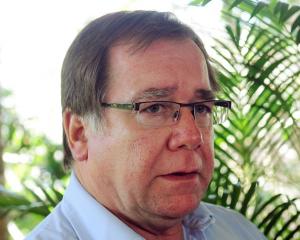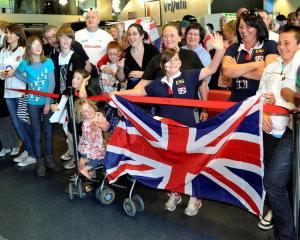
Guerrillas in the midst of the Rugby World Cup can expect to be mercilessly mown down - and we're not talking about terrorists.
Tournament promoters are gunning for anyone who gets offside with tough laws designed to protect the multimillion-dollar investment made by principal sponsors.
Edgy entrepreneurs who think ambush marketing might help them muscle in on one of the planet's most-watched and most-hyped sporting events risk being red-carded.
"Ambush" or "guerrilla" marketing refers to surprise promotions and stunts by smart operators not signed up as sponsors or licensees of commercially "protected" extravaganzas.
The Major Events Management Act 2007 (Mema) was introduced to assure official backers their rights will be protected.
Anyone else who tries to profit from suggesting a link with the Rugby World Cup - even by using that or associated phrases in advertisements or promotions - is likely to feel the organisers' sprigs.
Mema covers a multitude of sins, including ambush marketing, ticket-scalping and pitch invasions.
Streaking during a RWC match could cost you $5000. Streaking with a brand logo tattooed across your butt could cost you $150,000. Keeping heavyweight sponsors Heineken, ANZ, Emirates airline, DHL and MasterCard sweet is deemed to be priceless.
While warning his clients to be ultra-cautious, RadioWorks Otago sales manager Chris Ramsay appreciates the risk-reward dynamic.
"Anyone with an entrepreneurial spirit is going to want to have a wee nudge at this. I guess it depends how brave you are."
Rugby World Cup 2011 is forecast to attract 2000 media representatives and generate an economic windfall of at least $540 million. Suitably subtle publicity stunts and clever ad campaigns could pay off handsomely. A serious breach of sponsors' rights, however, could leave a business buried under the mother of all rucks.
"Plenty of clients are wanting to leverage off the opportunity, but they understand the difficulties," Ramsay says.
Oblique World Cup references may be safest, he suggests: " 'Warm beer' for the Poms or 'get a juicy steak' for the Argentinians".
Ireland, Italy, Georgia and Romania will join the England and Argentina teams in using Dunedin as a base at various times during the six-week tournament.
To check a clever idea is not going to get you in trouble, it may be best to talk to a lawyer.
The Dunedin City Council has joined the Ministry of Economic Development to police breakaway attempts to cash in on Rugby World Cup 2011, which kicks off on September 9. Local businesses were invited to a meeting on Thursday night to learn more about their legal obligations.
Mema enables counterfeit merchandise to be seized, offending signs to be taken down, controlled zones to be temporarily established around stadiums and commercial activities that seek to unfairly ride the tournament's coat-tails to be prosecuted.
The law changes were primarily motivated by the Rugby World Cup but have also been used for a handful of other international events, including last year's World Rowing Championships.The Lake Karapiro regatta was infiltrated by a promotions car for the energy drink Red Bull, according to Dunedin Rugby World Cup co-ordinator Debra Simes.
"It managed to get through the cordoned area and across a one-lane bridge ... and, of course, loads and loads of Red Bull girls jumped out and started distributing Red Bull cans."
With up to 13,000 English footy supporters expected in Dunedin, along with television crews and a pack of tabloid newshounds sniffing out quirky and offbeat stories, how many Otago firms might be tempted to pull a stunt?
Not many, judging by a quick ring-around.
"We'd urge our clients to err on the conservative side," Creative Advertising managing director Tony Crick said.
One of his clients is a Dunedin brewery that will probably fall within the Mema clean zone on match days.
"We're trying to work out what they can and can't do. We don't want to test it and have a bloody great lawsuit on our hands. It might be great for the brand but it's a bloody risky strategy."
Crick believes Mema is too heavy-handed.
"From a New Zealander's point of view, where we've been reasonably democratic about branding and branding rights, it just seems to me to be draconian.
"It's so controlling. It's unbelievable from a free-market point of view."
Simes says she expects guerrilla marketers to target our biggest sporting showcase. Defeating them, she adds, is crucial if New Zealand is to attract future global events.
"This is quite important for us also. We want to ensure Dunedin is recognised as a city that is able to responsibly host these events."
Rugby New Zealand 2011 is the company responsible for planning and executing a seamless tournament. Communications manager Mike Jaspers says that couldn't happen without safeguarding big-name sponsors.
"It is the major source of income for the International Rugby Board and they redistribute that money to countries around the world, from Samoa to Kazhakstan, to grow the game."
Ambush marketing is a vexed issue, bringing free market competition and trademark and rights protections into direct conflict.
It's a deal-breaker for most major sponsors (or "worldwide partners") who insist on the tightest possible controls to stop imposters snatching the limelight.
Fifa has made it a priority, as has the International Olympic Committee. Advertising and street trading regulations are being formulated for next year's London Olympic Games.
In New Zealand, the Mema legislation draws on the accumulated wisdom of overseas experiences.
Companies here won't be able to cutely pass themselves off as an "unofficial" RWC brand, for example. At last year's Fifa World Cup in South Africa, budget airline Kulula got terrific mileage from selling itself as the "unofficial national carrier of the you-know-what".
Still, it was small change compared to the coup Dutch beer Bavaria tore off when 36 women in skimpy orange dresses turned up at the Netherlands v Denmark match. They were escorted out of the ground and two of the glamorous ringleaders were arrested.
The so-called "Bavaria Babes" story went viral and, no doubt realising it couldn't win hearts and minds, Fifa dropped the charges and all other claims in exchange for the brewery promising to behave itself at Fifa events until 2022.
A few months later, Irish bookmaker Paddy Power was forced to demolish a giant Hollywood Hills-style sign erected in his name as a cheeky backdrop to golf's Ryder Cup.
You win some, you lose some ...
Flirting with Mema has already burnt one entrepreneur. Last September, Terry Lung Chan and his company, CLNZ Trading Company Ltd, were fined $40,000 for importing more than 1300 fake Rugby World Cup T-shirts.
More than 20 years before Mema became law, when the All Blacks last had their mitts on the William Webb Ellis trophy, Dunedin ad man John Swann had an unfortunate brush with ambush marketing. Swann, who runs T & D Advertising & Marketing, was asked to design and print a 1987 Rugby World Cup publication on behalf of a Christchurch man he'd never met.
"An entrepreneurial guy who came in off the road," he wanted the typeface and design features to mimic an official cup publication.
"He got as close as he could to it without getting himself in the gun," Swann says.
The venture flopped and Swann says the man's $30,000 cheque bounced.
"There were a helluva lot of people that did entrepreneurial things to capitalise on the [1987] World Cup."
Swann says he filed the setback in his drawer of "hard-learned lessons" and certainly won't entertain anyone who might fall foul of Mema.
"I'm as liable as they are. When they go down, I go with them."
Dunedin's Speight's Brewery is in an interesting position, with Heineken trumping it as a major sponsor for the 2011 tournament. It's ironic that Speight's grabbed headlines by shipping an ale house to London in 2007, yet it won't be able to flex its full marketing muscle when thousands of English footy fans pour into Dunedin this spring.
If it's a bind for Neil Hinton, corporate affairs director for Speight's owner Lion, he isn't letting it show.
"We're the sponsor of the All Blacks. We don't really need to get involved with the tournament... we're not interested in trying to ambush that at all."
So there'll be no knock-off of the Bavaria babes, no sea of branded blue and gold at Otago Stadium?
"Certainly, we wouldn't do anything like that ... we're very aware of all the Mema rules and we've got no intention of going anywhere near breaching them."
Individuals won't be pinged for wearing an Otago jersey with Speight's branding, or any other non-sponsored gear, to World Cup games - so long as all your mates don't turn up wearing the same thing.
Hinton rightly points out there are no restrictions on Speight's usual advertising activities.
Pubs and bars are loath to push the promotional boundaries, Dunedin's Speight's Ale House owner Mark Scully says.
General nods to the game are reasonably safe.
Difficulties arise with referring to a game, and the specific occasion.
Pubs and bars are expected to play it safe by using the likes of "rugby on the big screen tonight" in their adverts.
The DCC will exclude opportunist street vendors and marketers from hawking their wares within 500m of the centre of Otago Stadium on each of the four game days, and the day before.
Enforcement officers from the council and the Ministry of Economic Development will work in tandem to snuff out any stealth action from those looking for a quick buck or a racy headline.
Police will be used as a last resort, Debra Simes says.
She is quick to emphasise there will be plenty of approved street performers and official merchandisers.
Buskers and charity groups rushing to get involved on game days are being asked to contact the council. They are likely to be shepherded to nearby venues with plenty of passing foot traffic, such as the railway station.
Simes says Mema is not about putting the frighteners on Dunedin firms, which will be able to advertise as they normally would.
"People can make the most of all the visitors who are here. That's the strong message, that it is business as usual."
Tourism Dunedin chief executive Hamish Saxton has heard no gripes about the promotional restrictions.
"I think there's a strong respect for the guidelines set by the IRB and the Rugby World Cup ... the biggest thing we're getting out of [it] is the opportunity to host media.
"I don't consider that our industry would be looking at compromising an amazing event in any way."
A recent BNZ-Business New Zealand indexed survey revealed a dramatic slump for the Otago-Southland service sector - business is down 18.6% on the same time last year.
A World Cup bump can't come soon enough, and businesses are finding their marketing comfort levels as they bone up on the dos and don'ts.
Rugby-themed knick-knacks are flying out the door at Tuapeka Gold Print, which operates from Lawrence and is Australasia's largest wholesale supplier of promotional products.
Co-owner Jim Robertson says companies are looking to springboard off World Cup fever by giving their clients a small token: pens with a rugby-ball clicker, branded water bottles and peppermints in the shape of a rugby ball.
"It's subtle advertising. You can't talk directly about the Rugby World Cup but you can put people in the mood," he says.
"Our sales in the last three months are up for the first time since the recession started," he says.
A squeezable rugby stress ball that can carry a firm's logo has been the hottest seller - up to 15,000 have been snapped up since it was offered earlier this year.
Students are obvious contenders for the outrageous and attention-grabbing but national Student Job Search chief executive Paul Kennedy has heard no rumblings.
"The upside if you can pull it off for a company is so significant it could outweigh the risk - but if you get it wrong you'd want to have pretty deep pockets."
Students have in the past been sought for some bizarre assignments, Kennedy says, including "rent-a-mob" political lobbyists and nude house-cleaning.
Astute ambush marketing projects would be considered, provided the client accepts liability if things go wrong, and student welfare is otherwise protected.
Airspace is not immune from Mema. Aerial banners that can clearly be seen from the protected stadium zones on and around match day will be in breach.
SkySignz boss Sam Elimelech is nevertheless weighing the possibility of circling other parts of Dunedin, in the hope he can be exempted from Mema for conducting "business as usual".
The Christchurch-based pilot has serviced Dunedin before and has already been approached by a potential client in the motor trade. If he gets the all-clear and additional World Cup interest, he will send a plane south.




